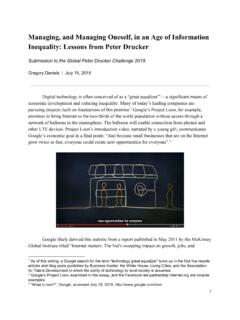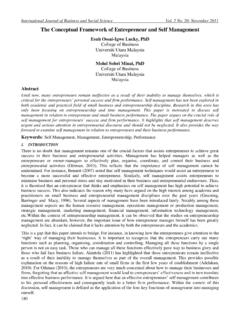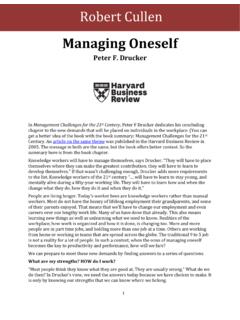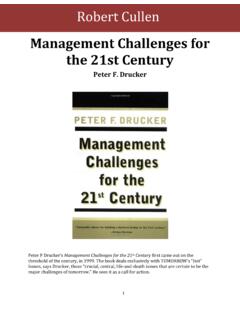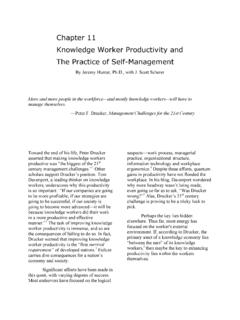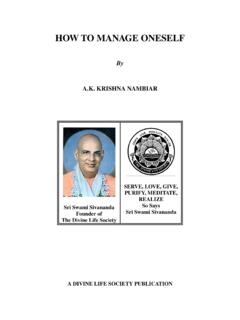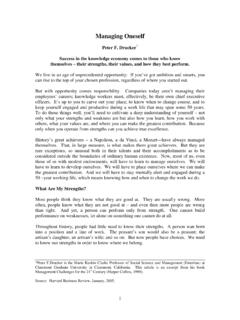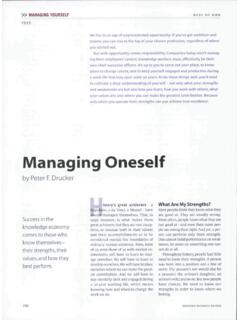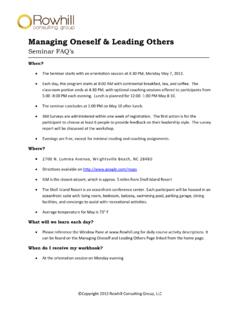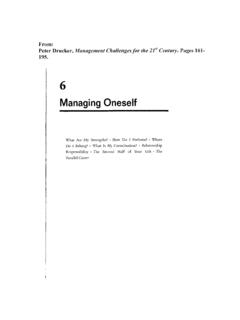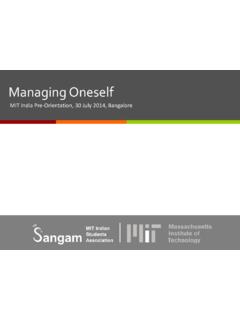Transcription of Know yourself and focus on contribution – a reflection on ...
1 Know yourself and focus on contribution a reflection on drucker s managing oneself By Khuyen BuiIntroductionEvery day I fight a battle: the Ideal Self tells me to read a good book, soak up all the wisdom and reflect on it, while the Actual Self jumps from tab to tab on my web browser, skims through all those self-help articles like How to procrastinate less to The one technique for better mental focus pretending I am actually being productive even during the time I mwasting. The Actual Self is the expert in telling excuses such as I need the Internet to do research for my work!" and the Ideal Self is the little voice that asks Do you really need it, orare you simply avoiding the difficult work?
2 Peter drucker says managing oneself is tough; how about managing two selves in an era of information overload and instant distraction like now?When was the last time we read something several pages long on our devices without getting distracted? Much has been said about the peril of multi-tasking: we think we save time in doing so, but research has shown that it takes us about 20 minutes to come back to our train of thought when we tackle a mentally demanding task. We know that quality work can only be achieved with focus , but how can we focus when our already limited attention is constantly interrupted by notifications from our devices? In this age of information abundance, we have to aggressively filter our media consumptionor we will end up with the mental equivalent of diabetes with our fast information diet.
3 Thedanger goes beyond just sapping our ability to focus . This culture of instant access to information and the easy answer mindset can make us impatient. As a result, we miss out the chance to develop our tolerance to uncertainty and our capacity to pursue hard work. Perhaps most importantly, we don t take the time to unplug to reflect on our own strengths, values and purpose, all of which are the crucial ingredients to our characters andfulfillment. In being constantly connected, we lose touch with of Missing Out, a common fear among the millennials, is magnified by the hyper-connection of this age. A friend commented on an application in my web browser that hidesaway all my Facebook feeds: "I hate wasting time on Facebook, but I am afraid I am missingout on news and updates from my friends".
4 But hasn't the world always been buzzing with changes whether we know them or not? Aren t we always missing out on something? Why does that fear seem so prevalent today? To answer that question, consider a young person growing up a few decades ago: he would go through the traditional schooling system, acquire certain technical skills, and become a professional. Life and career options were fewer and often more structured. As such, he had time and space to grow without getting too overwhelmed. In contrast, a young person today is presented with so many options that it becomes paralyzing. These options are not only about what we can eat, buy, or play but also about more significant matters like what career path we want to pursue and how we want to live our lives.
5 On the plus side, being aware of more possibilities may explain why young people nowadays have higher expectations of ourselves and the work we do - how can we imagine selling our souls and our creative energy to become a cog in a machine? We look at a job beyond as a means to an end. We want to do work that matter. However, when that awareness is not grounded in reality, FOMO can become a serious issue. As part of human nature we want to appear good and thus we don't talk about our failures as often as our successes. Oftentimes only the good stories make it to the headlines,and the digital age only magnifies this phenomenon. The Internet is fraught with successful stories of startup founders who become millionaires overnight, or lifestyle designers who work from home or anywhere in the world at whatever time they want.
6 As a result, we have an overly rosy view of the world with the other sides of these stories often untold the failures, pains, and sacrifices. We fear missing out because we only see the good articulated this problem in his essay "in a knowledge society, however, we expect everyone to be a success. This is clearly an impossibility. For a great many people, there is at best an absence of failure. Wherever there is success, there has to be failure." The danger of such skewed expectation, especially in an individualistic society that glorifies personal success, is that its counterpart - failure - may also be taken too personally. It then becomes a crippling shame instead of an empowering people I find "larger than life" are those who think big but act small.
7 They are those who practice what drucker says about managing oneself : work hard to improve on one's strengths and remedy bad habits that hinder one's potential. They understand that Success is a journey where they aim for smaller successes one after another, and not forget learningfrom every step along the way. Understanding oneselfPerhaps the most important insight of drucker 's managing oneself , and in general his human-centered principles of management, is that one can and should invest in his personal development. Hard work and worthy challenges will stimulate one's growth, and frequent reflection through structured feedback analysis will ensure one does indeed develop in a productive direction for himself.
8 Moreover, such reflection will also clarify one's values, which "are and should be the ultimate test" according to can one start this process of understanding oneself ? To me, journaling is a helpful tool for reflection . Thoughts in our heads are unclear until we pin them down into words. Some people prefer the familiarity of pen and paper; others may prefer typing on a computer. Stick with anything you choose for a while first. Since I committed to a regular time for a conversation with myself, I began to see myself much clearer: my strengths, weaknesses, habits, and values. I can step back and see myself overthinking, worrying, and panicking. Through this act of reflection , assumptions and judgments are surfaced and then systematically examined.
9 Insights about myself and clarity about what to do next then come more naturally. "Follow effective action with quiet reflection . From the quiet reflection will come even more effective action." as drucker advises most challenging and also strangest part of the journaling exercise is that it is hard to be honest with oneself . I once read somewhere this quote "There are two reasons we do anything: the one we tell other people and the real one". Surprisingly, even though no one else will ever read my journal it is still hard to write out every thought or feeling I have. Theprocess of coming to terms with oneself is slow and frustrating. It may even be frightening for some, but it is always rewarding.
10 It is like taking a cold shower: at first, we are scared, but after the first shock we gradually adapt to the temperature and once we are done we feel amazing. With time and experience I became less judgmental and more understanding of myself. Being clear of my strengths and values gives me a sense of direction from which choices become easy. I learn to accept that I cannot do everything well, and I know what I choose to do is most important for me. With that comes a tremendous peace of mind; the fear of missing out and its close friend, regret, then slowly my ongoing journey to understand myself better, I have gradually come to accept a paradox: I am enough, and I can be more.
